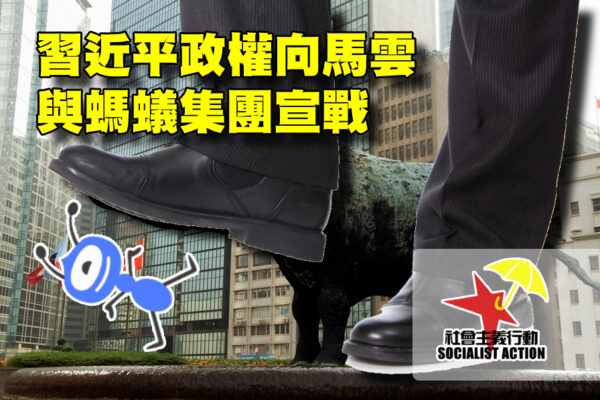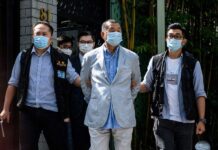CCP dictatorship’s plan to curb the power of tech oligarchs sends shockwaves through the system.
Lee Yong, chinaworker.info
This article first appeared on chinaworker.info on 14 November and has been translated to English for ISA.
The last-minute chaotic cancellation of Ant Group’s giant IPO (i.e. stock market ‘initial public offering’) shows a major new conflict has erupted between the Chinese dictatorship (CCP) and the new capitalist oligarchs of China’s tech sector. This move is tantamount to a “declaration of war” at the same time as the regime is embroiled in many others “wars” not least with a hostile US government. Reports say that Xi Jinping personally intervened to block Ant’s IPO, despite the significant blow this has dealt to the CCP’s market credibility at a time when the US is demonising Chinese tech companies on grounds they are fronts or auxiliaries for Chinese state control.
The A-shares and H-shares of Ant Group, China’s finance technology firm which mainly focuses on servicing the microfinance industry, was due to be publicly listed on both the Shanghai’s Science and Technology Innovation Board and the Hong Kong Stock Exchange on 5 November 2020. This was set to be the biggest ever IPO, eclipsing Saudi Arabia’s oil giant Aramco earlier this year. Both Ant listings were initially valued at 230 billion Chinese yuan, potentially increasing in value to as much as 310 billion US dollars once the group starts trading publicly. This potential amount in market value surpasses many big global banks such as Citigroup and Goldman Sachs, and almost equals the market value of JP Morgan. News of the initial issuance of the shares triggered mass-speculation in the Chinese and Hong Kong stock exchanges. Both the A-shares and H-shares were oversubscribed by nearly 900 and 400 times respectively. This colossal amount of market hype from potential initial subscribers was touted as the largest fundraising plan in human history.

An abrupt halt
Nevertheless, this “impressive feat” was cancelled on the 3 November 2020, two days before the actual listing. On the 2 November, the People’s Bank of China, the China Banking Regulatory Commission, the China Securities Regulatory Commission, and the State Administration of Foreign Exchange conducted an interview with Jack Ma, the chairman and CEO of Ant Group and China’s second wealthiest billionaire (Ma is ranked as 22nd richest in the world).
In addition, on the same day the China Banking and Insurance Regulatory Commission, in conjunction with the central bank, PBOC, released a set of interim measures in order to regulate capital flow of companies that issue microloans online. It is widely interpreted that the new measures are directed specifically at Ant Group.
Prior to this everything appeared to be smooth sailing for Ant’s stock market listing. The sudden and tumultuous decision to block the IPO exposes the often contradictory and uncoordinated ways in which the wheels of the CCP machine turn. Until the issue landed on Xi Jinping’s desk, something that apparently did not occur until Jack Ma’s “disrespectful” speech at an economic forum just days before the planned IPO, it seems nobody was really “in control”. We saw a similar lack of coordination during the 2015 stock market and currency crisis, which is an important lesson about how economic crises and shocks in China can quickly get out of control in the future.
In August, China’s Securities Regulatory Commission took only 25 days to complete the process, from accepting Ant Group’s IPO application to finalising the approval, which itself is unprecedented. However, eyebrows were raised when the authorities went from being very supportive of the process to bringing it to a sudden halt. Many speculated that it was Jack Ma’s public criticism of the CCP during the second Bund Financial Summit in October 2020. In his speech he made a remark about the government’s financial regulatory policies, stating that they were too restrictive and outdated.
Anyone who understands a little bit about the bureaucracy of China’s financial regulatory sector will know that the interim measures that were released on the same day that Jack Ma was summoned to an “interview” must have taken at least one or two years to finalise, from the initial drafting of the measures to public announcement. Therefore, it is unlikely that these measures were created solely to stop Ant Group from listing. The most likely sequence of events is that Jack Ma became aware that some sort of regulatory tightening was imminent. Hence, the criticisms about the government in his speech were probably an attempt to galvanise public opinion in attempt to put pressure on the CCP authorities to back down over implementation of the new rules. But this then backfired by angering the authorities and alerting Xi Jinping.
The fears of the dictatorship are not just that individual capitalists like Ma can become too “independent” and arrogant, but that their economic power can in future become too great for the regime to suppress, forcing the regime to bend to “market forces” in a way that has a dangerous logic for a regime that constantly needs to show itself as the greatest power in society.
Jack Ma himself has always claimed that Ant Group is a “tech-based company”. Simply put, Ant Group has branded itself as providing services similar to the Chinese e-commerce giant, Alibaba Group, also owned by Jack Ma. Ant offers electronic payments, acting as an intermediary in financial transactions including issuing microfinance loans.
Yet these are not the only services that Ant Group provides. According to the group’s prospectus the enterprise is divided into three major sectors: The first being an electronic payment platform similar to Alibaba’s ‘Alipay’; the second being an electronic financial platform that provides financial services such as microfinance, wealth management and insurances for businesses; and the third comprising of other services such as providing credit reports, using big data or blockchain technology, overseas transactions etc. From this it can be seen that its core business is to provide financial services and therefore should undoubtedly be classified as a financial institution, and not only that, but a very big one – one which could increasingly drag China’s state banks in directions that may conflict with the core needs of the CCP regime.
Nevertheless, Jack Ma hoped that by branding Ant as a “tech-based enterprise”, it could evade the regulatory controls within the Chinese financial industry such as being forced to observe certain leverage ratios and capital reserve ratios.
Rising debt
As of June 2020, Ant Group had generated a total of 2153.6 billion yuan (US$329 billion) of loans in China. Looking at the financial report of Ant Group’s Small and Micro Loan Limited Company, by the end of 2019 it only had net assets of 17.7 billion yuan, of which 12 billion was in registered capital. That is, Ant Group has issued more than two trillion in loans with less than 20 billion in capital reserves. Based on these numbers Ant’s capital adequacy ratio was only 0.8 percent, far below the 4 percent requirement contained in the Basel Accord, a global benchmark. As Ant Group itself is not a “bank” it is not governed by the Basel Accord. In his infamous October speech, Jack Ma dismissed the accord as a “club for the elderly”.
China has been debt-ridden since the global financial crisis in 2008. In order to prevent the situation from spiralling out of control, the financial regulatory authorities have been actively implementing policies in recent years in order to try to reduce the leverage ratio in the financial sector. Despite this campaign to limit “financial risk”, China’s debt-to-GDP ratio rose 11 percentage points in 2019 to 310 percent, and rose a further seven percentage points this year hitting 317 percent in the first quarter, according to the Institute of International Finance.
The debt-to-income ratio amongst Chinese people is 61.4 percent. Although it is not as high as 98.6 percent during the subprime mortgage crisis in the United States, the debt-to-income ratio of Chinese people was only 17.9 percent in 2008. Evidently it has skyrocketed by 200 percent within this period! To put things into perspective, it took around 40 years for the debt-to-income ratio of US residents to rise from 20 to 60 percent, whereas China took only around ten years. Indirectly this also reflects the increasing wealth gap between rich and poor within China.
Ant Group is now being widely blamed for exacerbating the growth of household debt in China. At the same time this shows the endless contradictions of capitalism, including with ‘Chinese characteristics’, because the CCP’s plan to boost personal consumption as part of the so-called ‘dual circulation strategy’ of Xi Jinping (to counter the US-led Cold War and economic decoupling) can only take place based on higher levels of consumer debt. This is because income levels for the masses are not enough to dramatically expand consumer spending. The CCP can impose more stringent regulations on companies like Ant, but this can also be self-defeating.
Not only this, but we can also draw parallels between the 2008 US subprime mortgage crisis and the cooperation between Ant Group and major banks. As of now, Ant Group has been cooperating with more than 100 banks. Yet Ant only contributes about 1-5 percent of the issued loans, whereas the banks bear the other 95-99 percent. In other words, Ant’s business model is completely parasitic, profiting from its role as an intermediary while the state banks carry all the risks.
At the same time, due to the impact of the epidemic, loans issued by the group that are overdue have doubled from 1.56 percent at the end of 2019 to 3 percent. The amount of overdue debt could be around 60 billion yuan, which is not a small amount! The predatory lending polices of Ant Group therefore constitute a ticking time bomb for China’s state-owned banks.
As China’s credit card industry is relatively small, the microfinance industry, dominated mainly by Ant Group, fills the market gap. As this lucrative business spans 800 million Chinese people, it can become “too big to fall” if the percentage of overdue debts continue to rise. In his October speech, Jack Ma claimed, “China’s financial sector does not have systemic risks because it basically doesn’t have a system”. This is ironic as Jack Ma is among those planting the risk into China’s financial system.
Stock market speculation
On the other hand, Ant Group’s method of issuing shares within the country is also questionable. In the beginning of September, Jack Ma sold his strategic allotment fund to the public through Alipay, raising 60 billion yuan. However the terms and conditions of the sale to the general public included a compulsory lock-in period of 18 months. Transfers are not allowed during that period. Yet different terms applied to big private companies and individual tycoons allowing them to sell ahead of ordinary shareholders whilst speculating on the soaring value due to the oversubscription of the group’s IPO.
On 7 November, Caixin.com published a list of Ant’s Group prominent shareholders. The list included Chinese private and state-owned companies, as well as foreign financial institutions such as the Singapore’s Temasek and Government Investment Corporation, the Malaysian Treasury, the Canadian Pension Plan Investment Committee and even Hong Kong pro-CCP tycoons like Li Ka-shing and Tung Chee-hwa, who each own 0.54% and 0.05% of the group’s shares respectively.
There was a wider big selloff of tech company shares in China after the new draft regulations to curb monopolistic practises in the tech sector were announced on 10 November. At the same time the realities of China’s economy entering recession are increasing. These events show how the CCP regime and its “superior” form of capitalism – authoritarian state capitalism – are heading into stormy waters, with growing political and economic contradictions.
The conflicts between the dictatorship and capitalist oligarchs like Jack Ma are sometimes directly, sometimes indirectly, connected to the internal factional manoeuvring within the CCP, which has also reached its highest level since the late 1980s. Xi’s intervention to block the Ant Group IPO may therefore also reflect political factors. In fact it is possible the political factors were the main reason – to send a signal and demonstrate that no individual, not even the previously richest man in China, is protected if they break the “rules” of Xi Jinping’s CCP. But every new “solution” from Xi Jinping – from Hong Kong’s national security law to the hardline stance against the US political and economic offensive – creates a new crisis. Jack Ma does not represent a “democratic bourgeoisie” that challenges the CCP for ideological reasons; his concerns are only to maximise his own economic power and standing. Ma is notorious for his advocacy for cruel ‘996’ work arrangements, and in the past praised Deng Xiaoping’s bloody 1989 crackdown against the democracy movement in China.
For socialists the solution is planning, not more capitalist “regulation”, whether from democratic or authoritarian governments, because capitalism always defies and negates regulation in pursuit of the highest profit. What is needed is public ownership of the big companies, including of course Jack Ma’s business empire, and democratic planning of the whole economy in the interests of the many rather than the few, not by a totalitarian regime or so-called technocrats, but through genuine public ownership under a democratically elected workers’ government, with control and management of enterprises in the hands of the people, the grassroots working class. If these companies which have amassed enormous power over society are left under the control of greedy capitalist speculators or short-sighted corrupt bureaucrats, that is a sure road to future economic crises and disaster.



